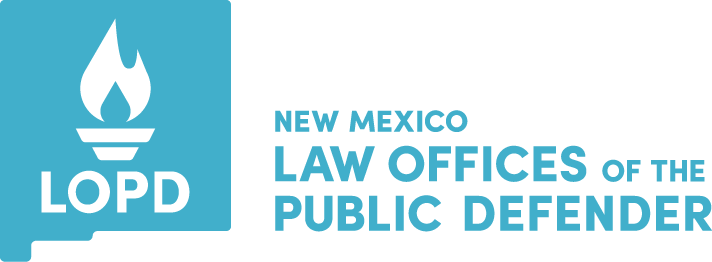Public Defender Representation And Court Process
Public Defender Representation and Court Process
Becoming A Client
The first step in resolving your case will be filling out the NM Public Defender Services Application. New Mexico law allows the Public Defender to represent only individuals who are charged with a jailable offense and unable to pay for all or part of the expenses of legal representation.
Initial Court Appearance
The first time in court is usually the arraignment. The arraignment is the formal charging of the case. Some misdemeanor cases can be resolved at arraignment by entering into a plea agreement. In felony matters, all defendants must enter a plea of Not Guilty. Following arraignment, a NMPD case file is opened and a lawyer is assigned. Also upon arraignment, NMPD makes an immediate demand for speedy trial and all of the discovery (police reports, evidence logs, photos) in the case.
Pretrial Release – Bail
If a case involves a DWI or criminal charge, the court will often ask that bail be posted to insure the defendants appearance in court. Bail is most often posted through a bond company that charges a fee of 10% and requires collateral for the bond. When a bail amount is set and bail is not posted, the defendant is held in jail until his trial or hearing date. The Public Defendant attorney will request reduction of the bail or other type of release when appropriate. If bail is posted and the defendant is released, the standard terms of bail prohibit drinking alcohol, use of drugs, and leaving Bernalillo County. If a person on bail fails to appear for a scheduled court hearing, the bail may be lost and a warrant will be issued for the person’s arrest.
Bench Trial or Jury Trial?
Depending upon the seriousness of the offense, each case is set for a bench (judge) trial or a jury trial. Full misdemeanors and felony offenses allow for a trial by a jury (community members). NMPD attorneys will advise each client regarding the type of trial best suited for their case.
Client Interview
Once an attorney is assigned and the discovery (police reports) for a case are received, the attorney or staff will schedule an interview with the client. At the interview all evidence for the alleged offense(s) will be reviewed. The attorney will also explain defenses, trial options and plea agreement offers.
Pretrial Conferences and Motion Hearings
After someone enters a plea of not guilty, the court may set pretrial hearings to discuss the case. The attorney may also file legal motions (requests) with the court on behalf of clients. Sometimes the court requires the client to be present at conferences and motions. Clients should discuss whether they need to appear for these hearings with their assigned attorney.
Plea Agreements
A Plea agreement is an agreement made with the state prosecutor in which a defendant agrees to plea to some charges in exchange for the state dismissing other charges or reducing the punishment. The NMPD attorney assigned to the case will explain any available plea agreement options to clients.
Preparing For Trial
Trial preparation may include getting all the police reports, interviewing witnesses, consulting with experts, and conducting investigation. Clients are encouraged to help gather information about witnesses and/or documents that support the defense of the case. All information should be brought to the attention of the assigned NMPD Attorney.
Trial
Trials can range from 1 hour to 3 weeks. Most misdemeanor cases take one day and are heard by a judge or petit jury of 6 people. Felony trials generally take a few days and are heard by a jury of 12 people. At a trial, the government has the burden of proving the accused guilty of all charges, beyond a reasonable doubt. All jurors must vote guilty for someone to be found guilty.
